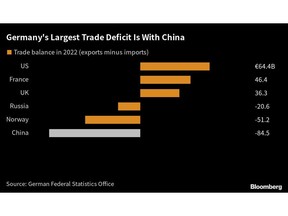Markus Duesmann, the chief executive officer of Audi, flew to China last week to tackle a problem that’s indicative of the challenges facing Germany: how to compete with its biggest trading partner on new technology.

Article content
(Bloomberg) — Markus Duesmann, the chief executive officer of Audi, flew to China last week to tackle a problem that’s indicative of the challenges facing Germany: how to compete with its biggest trading partner on new technology.
Advertisement 2
Article content
The head of the German luxury brand went to visit Audi’s Chinese joint venture partners — China FAW Group Co. and SAIC Motor Corp. — to discuss ways to sell more electric vehicles in the world’s largest car market. The effort is critical not just for the Volkswagen AG unit but also as a test of Germany’s ability to navigate threats to its competitiveness.
Article content
Germany’s vaunted automakers dominated the combustion-engine era, but the transition to electric vehicles puts their standing at the pinnacle of the auto industry at risk. Audi, Mercedes-Benz Group AG and BMW AG are ramping up their range of battery-powered models in a critical bid to compete with Tesla Inc. and upstarts from China, including BYD Co. and NIO Inc.
Article content
Advertisement 3
Article content
Read more: VW Shows €25,000 EV to Compete Where Tesla Has Left an Opening
“The transition to electric vehicles in China is naturally a challenge for us,” Duesmann said in an interview at Audi’s headquarters in Ingolstadt. “We haven’t participated in the growth in the electric vehicle market as much as we’d have liked.”
The shift to cleaner technologies presents more than one dilemma for Germany. The war in Ukraine exposed the country’s reliance on cheap Russian gas for its energy needs, and the shift to renewable power has been slow. There’s also raw materials needed for batteries, which mainly come from China.
That means Germany’s automakers need to overhaul their product range and their manufacturing system at the same time.
Advertisement 4
Article content
“Energy costs will be decisive for us, for Germany and for Europe,” said Duesmann. “Energy costs play an enormous role in the production of a car. The raw material costs play a huge role.”
For years, Germany gratefully sold cars, chemicals and machinery to the Asian superpower, but more recently the tables have turned and the trade deficit is growing.
“China was moving very fast before, and then we as a society weren’t watching closely for three years and they’ve kept moving,” said Duesmann. “It’s like when you’re watching a marathon race and you turn away for 30 seconds and then the competition is somewhere else completely when you look back. That’s how it is with China.”
In an effort to catch up, Audi is building an electric vehicle plant in Chengchun and has already rolled out its Q4 e-tron and Q5 e-tron Roadjet in China and will add the RS e-tron GT later this year. But the bulk of its sales are conventional cars. Audi’s deliveries in China slumped 8.4% to 643,000 vehicles in 2022, but still comprised 40% of its global sales.
Advertisement 5
Article content
Volkswagen’s efforts to transition to the new automotive era has been fraught with setbacks, and delivering fresh momentum is among the most pressing tasks for the auto group’s new CEO Oliver Blume.
A chaotic software push — now bundled under the Cariad unit — has been one of the biggest headaches and reflects the difficulties facing an old-school engineering company to integrate new skills.
For a time, Audi was overseeing an initiative to develop a common operating system across Volkswagen’s 12 brands, and customers have grappled with unnerving glitches and trips to the garage instead of receiving over-the-air updates like Tesla.
New software-led common vehicle underpinnings have been postponed by several years with significant delays for key new models like the Audi Q6 e-tron and electric Porsche Macan. Volkswagen this week revealed a jump in planned spending, partly driven by a push to improve its lineup in China.
Advertisement 6
Article content
“China is the new benchmark for us regarding development time,” Duesmann said.
Along with the rest of Europe, Germany is caught between China’s growing ambitions and US efforts to lure more investment. The European Union unveiled a response this week with the Net Zero Industry Act — a raft of new measures aimed at nurturing green tech and securing raw materials.
Here’s a detailed breakdown of the EU initiative
The EU needs to find the right answers to maintaining the bloc’s industrial competitiveness and avoid being left behind in these shifts, according to the Audi chief.
“It’s a European question and it’s urgent,” said Duesmann. “An enormous amount is happening in China and the US, and we of course can’t look away. Otherwise, the marathon runners will have turned the corner, and we won’t see them anymore.”
Stay connected with us on social media platform for instant update click here to join our Twitter, & Facebook
We are now on Telegram. Click here to join our channel (@TechiUpdate) and stay updated with the latest Technology headlines.
For all the latest Business News Click Here
For the latest news and updates, follow us on Google News.



Comments
Postmedia is committed to maintaining a lively but civil forum for discussion and encourage all readers to share their views on our articles. Comments may take up to an hour for moderation before appearing on the site. We ask you to keep your comments relevant and respectful. We have enabled email notifications—you will now receive an email if you receive a reply to your comment, there is an update to a comment thread you follow or if a user you follow comments. Visit our Community Guidelines for more information and details on how to adjust your email settings.
Join the Conversation